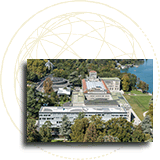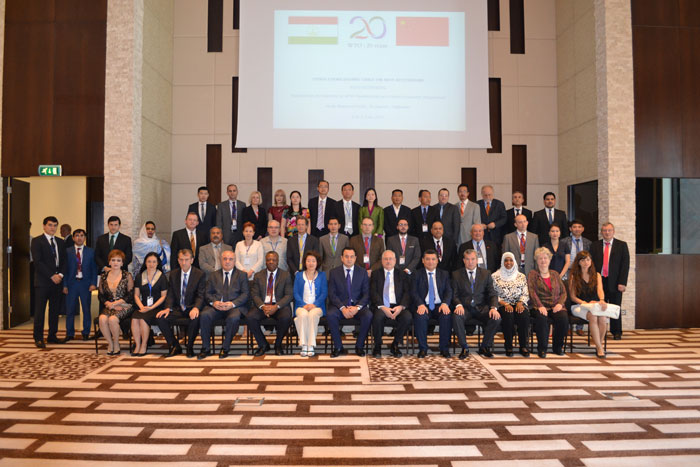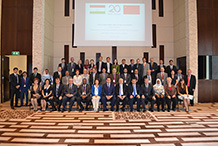- accueil
- membres de l'omc
- accessions
- table ronde dushanbe 2015
Troisi鑝e table ronde de la Chine sur les accessions ?l'OMC
Titre: “Tirer pleinement parti des avantages du statut de Membre de l'OMC et de l'intégration économique mondiale”
Parrainage: gouvernement chinois
Hôte: gouvernement du Tadjikistan
Organisation: Secrétariat de l'OMC
Date: du 2 au 5 juin 2015
Lieu: Douchanbé (Tadjikistan)
Voir aussi:
Ce programme de la troisième table ronde de la Chine et les documents distribués dans le cadre du Programme de la Chine en faveur des PMA et des accessions ont été entièrement et exclusivement établis à des fins d'assistance technique et de renforcement des capacités et sous la responsabilité du Secrétariat de l'OMC. Ils sont sans préjudice des positions des Membres ni de leurs droits et obligations dans le cadre de l'OMC.
DAY ONE: Tuesday, 2 June 201 |
|
8:45 |
Group Photograph
|
|
|
|
9:00 |
Opening Ceremony |
9:45 |
Session 1: Round Table Discussion on Central Asia and the WTO — Priorities, Challenges and Opportunities As the WTO celebrates its 20th anniversary this year, Central Asia is injecting energy and dynamism to the organization and providing growth opportunities for the global economy. Accessions of Afghanistan and Kazakhstan are on the threshold of conclusion. Others are changing into speed gear to advance their accession negotiations. Others are knocking on the door of WTO membership. At the same time, Article XII Members from the region and their neighbours are exercising and deepening their membership. The impact of their WTO membership is being felt in the work of the organisation and economic relationships in the region. Central Asia is in the midst of experimenting with different forms of regional integration, which present both opportunities and challenges for the Multilateral Trading System. How can the WTO and its Members foster the deeper integration of Central Asia into the rules-based Multilateral Trading System? How can the WTO improve its engagement with Central Asia for mutual benefit and win-win scenarios? What are the core experiences and lessons from this region, over the past twenty years, on which the WTO should focus for its engagement with the region? How can the WTO foster the deeper integration of Central Asia into the rules-based Multilateral Trading System and the global economy? How can the WTO improve its engagement with Central Asia for mutual benefit and win-win scenarios? Co-Moderators: H.E. Mr. Saidrahmon Nazriev, First Deputy Minister of Economic Development and Trade, Tajikistan Mr. David Shark, Deputy Director General, WTO Speakers (15 minutes): "21st Century Silk Road: Trade Integration in Central Asia: Overview of Trade Policy Developments in Central Asia" "One Belt and One Road" "Eurasian Economic Integration" "WTO Accessions in Central Asia"
|
11:15 |
Coffee Break
|
11.30 |
Commentators (15 minutes): H.E. Mr Muzammel Shinwari, Deputy Minister of Commerce and Industries and Chief Negotiator for WTO Accession, Afghanistan Mr. Yernar Bakenov, Director, Department of International Economic Integration, Ministry of National Economy, Republic of Kazakhstan Mr. Alexei P. Kireyev, Senior Economist, International Monetary Fund Open Discussion: All participants
|
13:00 |
Lunch
|
14:00 |
Session 2: Transition from Accession to Membership –Maximising the Benefits of WTO Membership and Global Economic Integration WTO accession is a tool for domestic reform, integration into the rules-based Multilateral Trading System and the global economy. Accession negotiations have served, inter alia, to update the rules of the trading system and in several instances have provided a platform to foster pragmatic approaches to international cooperation between and amongst Members and/or Acceding Governments. Yet, after the hard-won WTO membership, new Members realize that enjoyment of its benefits is not automatic. Maximising the benefits of WTO membership requires implementation of obligations of membership; and, sustained domestic coordination, equivalent to efforts in concluding an accession. Are their Post-Accession Models and Templates that Article XII Members can use? This session will review and discuss different experiences and practices on the transition from accession to membership, based on surveys conducted by the Secretariat and presentations by Article XII Members. Moderator: Mr. Chiedu Osakwe, Director, Accessions Division, WTO Speakers (15 minutes): "Post-Accession: Concept, Institutional Framework and Support" "Post-Accession Action Plan: Case of Tajikistan" "Post Accession: Looking Back 14 Years after Accession: Case of China" Open Discussion: All participants
|
15:30 |
Coffee Break
|
15:45 |
Speakers (15 minutes): "LDC Proposal on Post-Accession Work Programme" "Post-Accession Challenges: A Perspective from an Non-Resident Member" "Post-Accession Challenges: A Perspective from a Geneva Mission" Open Discussion: All participants
|
17:00 |
End of Day One |
DAY TWO — Wednesday, 3 June 2015 |
|
09:00 |
Session 3: Post-Accession: Participation in the Regular Work of the WTO — Perspectives of Article XII Members The implementation of the WTO Agreements, including accession-specific obligations and commitments, is at the heart of the organization's work and thus of the WTO membership of Article XII Members. Participation in regular work, which is overseen by the three Councils (Trade in Goods, Trade in Services and TRIPS) and their 15 subsidiary bodies, as well as other Committees, Working Parties and Groups reporting directly to the General Council, requires high level of internal coordination, both at levels of inter-ministerial and capital-Geneva. New Members start their participation in regular work, with the submission of notifications upon accession. However, to exercise full membership, new Members have to shift from negotiating engagements to membership engagement, based on concept of a balance of rights and obligations. How should new Members seek to balance their rights and obligations? This session will review different models, challenges and modes of participation in the regular work by Article XII Members. Moderator: Mr. David Shark, Deputy Director General, WTO Speakers (15 minutes): "Setting up the Internal Coordination Mechanism to participate in WTO regular work" "Implementation of WTO Commitments and Notification Requirements"
|
10:30 |
Coffee Break
|
11:00 |
Speakers (15 minutes): "The Dispute Settlement Mechanism: Experience of an Article XII Member" "Participation in Accessions Negotiations: Perspective of an Article XII Member" "EAEU and RTA Issues in the WTO" "GATT Articles XII and XXVIII: Experience of Ukraine" Open Discussion: All participants |
12:30 |
Lunch |
13:30 |
Session 4: Post-Accession — Deepening Domestic Reform through WTO Membership The accrual of benefits of WTO membership is inter-dependent with the implementation of accession obligations and commitments and sustained domestic reforms. Domestic reforms associated with accession negotiation do not terminate the end of the domestic reform process but the start of another. Accession negotiations provide governments with an instrument to support the fundamental priority of governments to improve welfare through competitiveness. The objective is the "natural objective" of economies to be competitive in the global economy. How can Article XII Members continue to utilise the WTO system, not only to sustain but deepen domestic reforms? This session review various efforts and experiences by Article XII Members of using WTO mechanisms, through the regular work or negotiations, to sustain and deepen WTO-consistent domestic reforms. Moderator: Mr. Thiago Couto Carneiro, Second Secretary, Permanent Mission of Brazil to the WTO Speakers (15 minutes): "WTO Trade Policy Reviews as an Instrument for Continuing WTO-Consistent Reform" "Participation of Article XII Members (Recently Acceded Members, RAMs) in the DDA Negotiations" "Macroeconomic Reforms Through WTO Membership" Open Discussion: All participants
|
15:00 |
Coffee break
|
15:30 |
Speakers (15 minutes): "WTO Trade Facilitation Agreement: Implications for Central Asia" "National Experience of the Trade Facilitation National Coordinating Committee" "Accession to the GPA: Experience of Ukraine" Open Discussion: All participants
|
17:00 |
End of Day Two |
DAY THREE — Thursday, 4 June 2015 |
|
09:00 |
Session 5: Post Accession Technical Assistance and Capacity Building The importance of technical assistance and capacity-building, during accession and post accession, cannot be over-stated for the realization of the benefits of WTO membership. In addition to general capacity building, new Members require tailor-made technical assistance, designed to meet post accession specific needs, starting with the domestic ratification of the Accession Protocol, the implementation of WTO obligations and commitments, and capacity building for domestic stakeholders, including the civil society, private sector and universities to ensure continued ownership and support, domestic reforms buy-in and ownership. This session will discuss both the demand and supply sides of technical assistance to explore a strategy for responding to specific post accession needs of Article XII Members. In addition to the representatives of international and regional organisations, the representative of the local development partners are invited to share their menu of assistance programmes. Moderator: Mr. LU Xiankun, Professor, Institute for WTO Studies, University of International Business and Economics, China Speakers (10-15 minutes): "Technical Assistance and Capacity Building Needs of Acceding LDCs" Ms. Hiba Elfadil Mohamed, Head of the Executive Office, National Secretariat for WTO Affairs, Accession Division, Ministry of Trade, Sudan "Post Accession Technical Assistance and Capacity Building Needs of Tajikistan" "Provision of Post Accession Technical Assistance and Capacity Building" Mr. C.C. Yu, Country Director, Asian Development Bank, Tajikistan Resident Mission Mrs. Patricia Veevers-Carter, Country Manager for Tajikistan, World Bank Mr. Richard Jones, Head of the Regional office, European Bank for Reconstruction and Development Mr. Norimasa Shimomura, Country Director, United Nation Development Programme Mr. Ezequiel Guicovsky Lizarraga, Senior Business Development Officer, International Trade Centre Ms. Nathalie Barbancho, Swiss Cooperation Office in Tajikistan Mr. Ovidiu Mic, Second Secretary, Head of Operations Section, EU Delegation to Tajikistan Mr. Jovan N. Jekic, USAID Representative of GIZ Representative of KFW
|
10:30 |
Coffee break
|
11:00 |
Open Discussion: All participants
|
12:30 |
Lunch
|
13:30 |
Session 6: Round Table Discussion on Post Accession "Best Practices" This closing session will conduct an exchange of views by all Round Table participants on the emerging best practices on post-accession, based on discussions from the previous sessions. The outcomes of the discussion will be summarized in a document entitled "Dushanbe Post-Accession Best Practices". This document, once finalised and adopted by the participants, will be submitted to the WTO Director-General, the Chairman of the General Council and the Sub-Committee on LDCs. Moderator: Mr. Chiedu Osakwe, Director, Accessions Division, WTO Reports from Sessions 2-5: Session 2: Mr. Najib Hamim, Economic Attaché (WTO Affairs), Permanent Mission of Yemen to the WTO Session 3: Mr. MAO Tianyu, First Secretary, Permanent Mission of China to the WTO Session 4: Mr. Thiago Couto Carneiro, Second Secretary, Permanent Mission of Brazil to the WTO Session 5: Mr. LU Xiankun, Professor, Institute for WTO Studies, University of International Business and Economics, China Open Discussion: All participants
|
15:30 |
Coffee break |
16:00 |
Closing Session: Remarks by Mr. Chiedu Osakwe, Director, Accessions Division, WTO Closing Remarks by Mr. MAO Tianyu, First Secretary, Permanent Mission of China to the WTO Closing Remarks by H.E. Mr Nematullo Hikmatullozoda, Minister of Economic Development and Trade, Republic of Tajikistan
|
17:00 |
End of Day 3 |
Partager
International Trade and Investment Conference Jointly organised by Asian Development Bank and the Delegation of Tajikistan |
Des probl鑝es pour visualiser cette page?
Veuillez 閏rire ?[email protected] en indiquant le syst鑝e d’exploitation et le navigateur que vous utilisez.


